七下Unit 4 Don’t eat in class. Section A(Grammar focus-3c)(共25张PPT)
文档属性
| 名称 | 七下Unit 4 Don’t eat in class. Section A(Grammar focus-3c)(共25张PPT) | 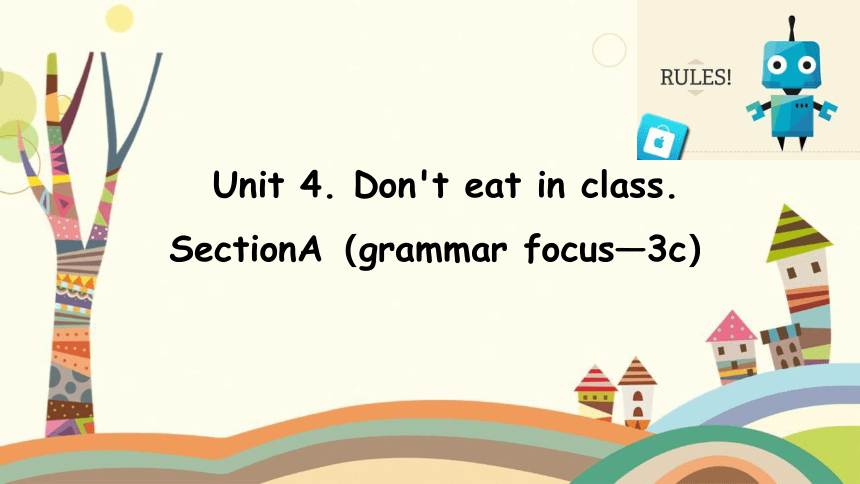 | |
| 格式 | zip | ||
| 文件大小 | 4.6MB | ||
| 资源类型 | 教案 | ||
| 版本资源 | 人教新目标(Go for it)版 | ||
| 科目 | 英语 | ||
| 更新时间 | 2020-04-12 19:01:06 | ||
图片预览

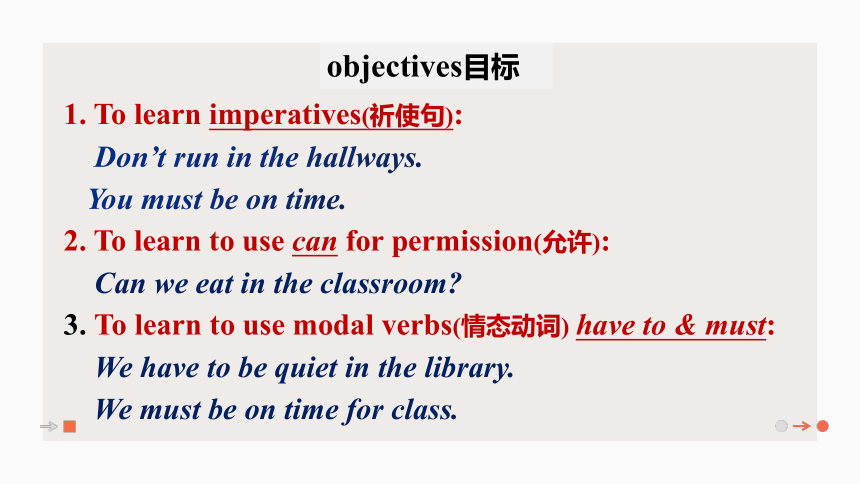
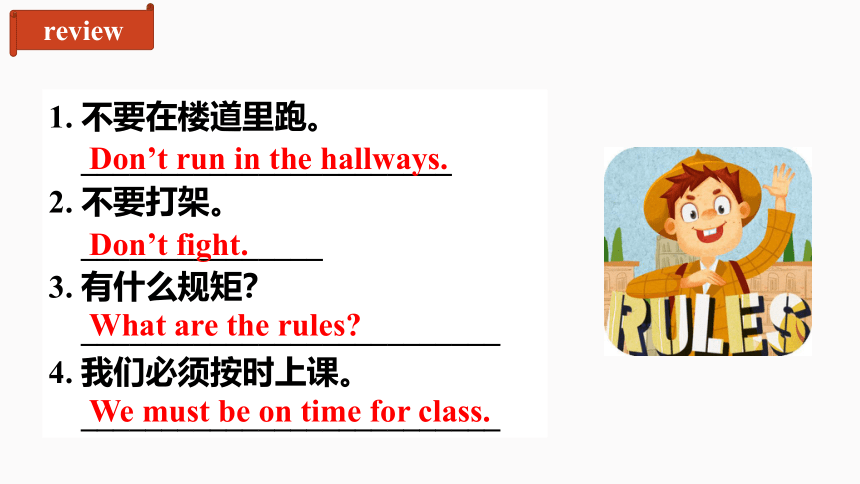
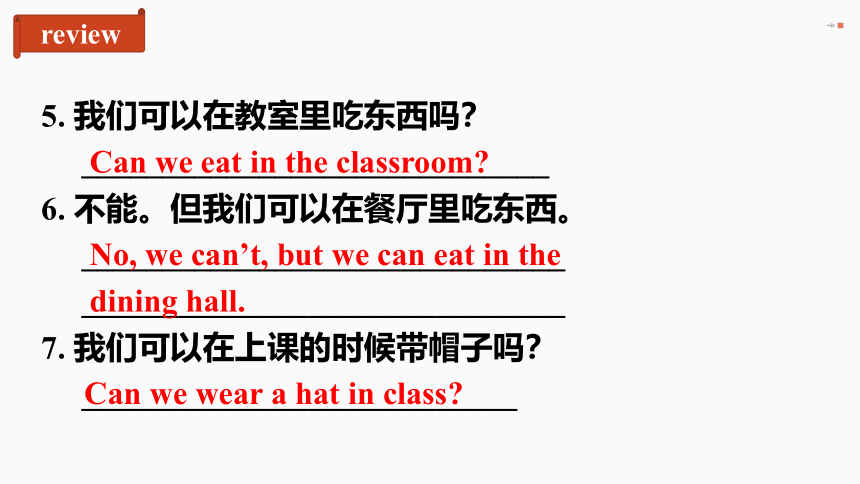
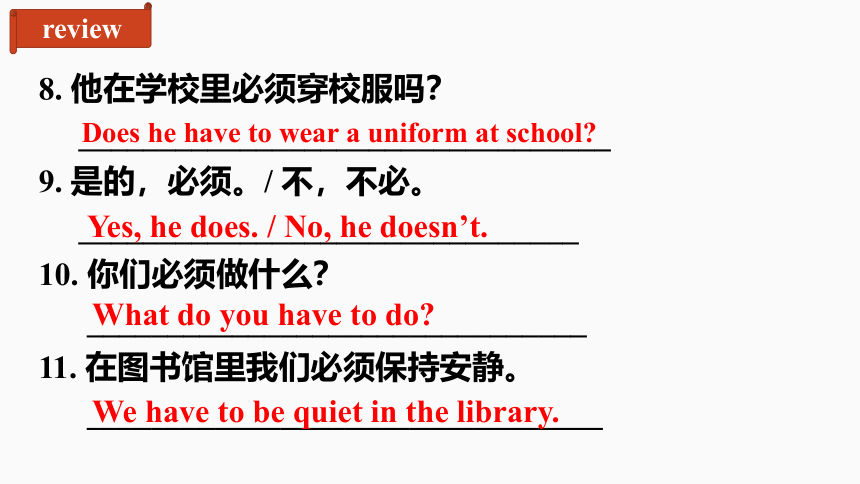
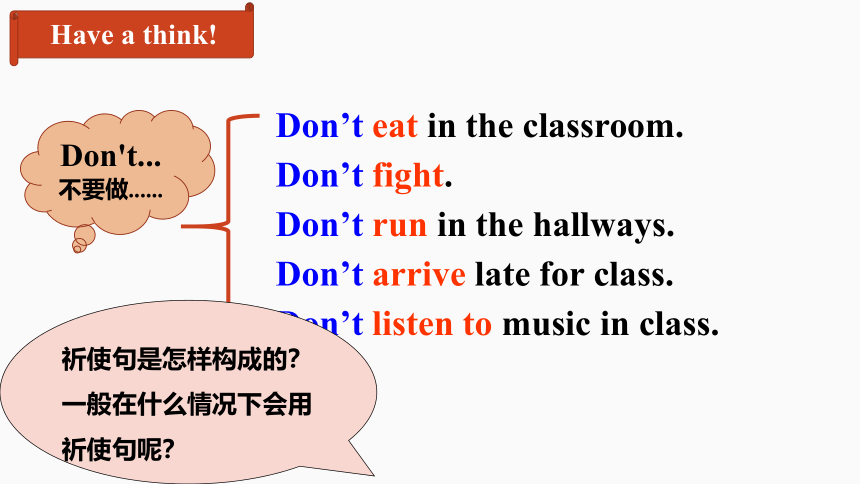
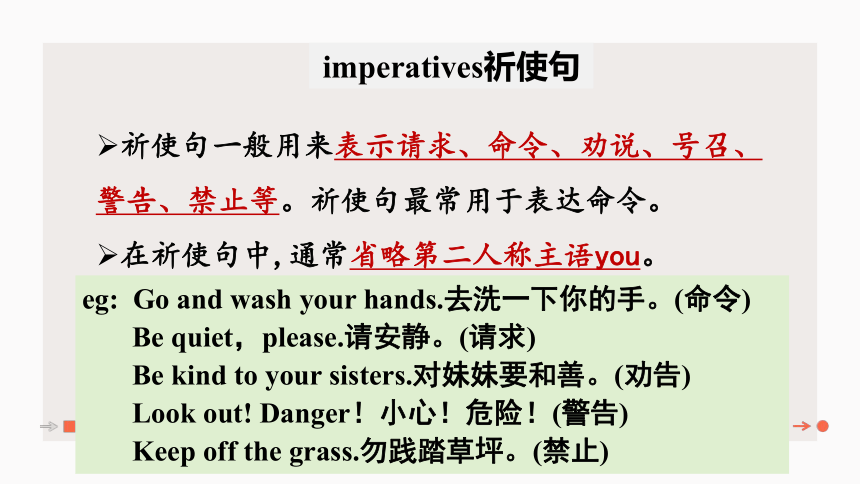
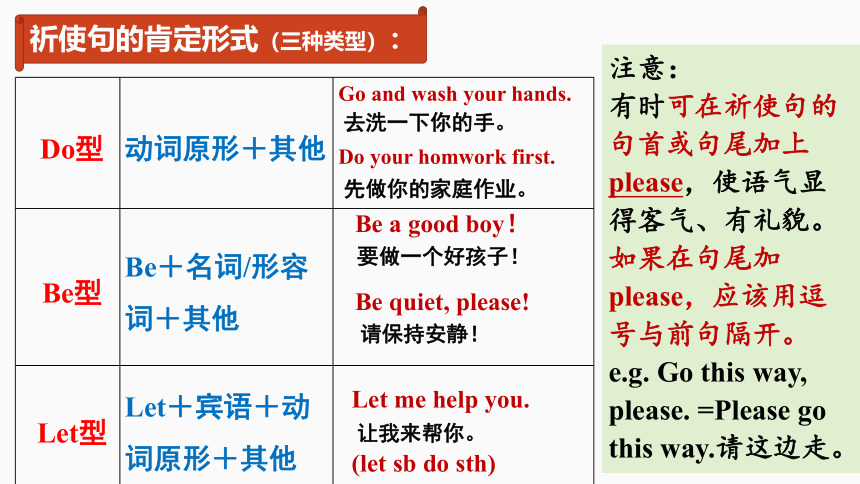
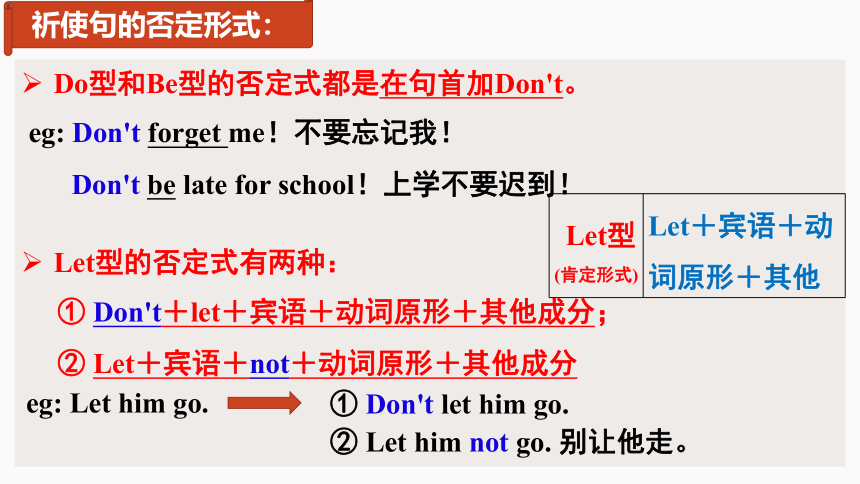
文档简介
(共25张PPT)
Unit 4. Don't eat in class.
SectionA(grammar focus—3c)
LOGO
1. To learn imperatives(祈使句):
Don’t run in the hallways.
You must be on time.
2. To learn to use can for permission(允许):
Can we eat in the classroom?
3. To learn to use modal verbs(情态动词) have to & must:
We have to be quiet in the library.
We must be on time for class.
objectives目标
1. 不要在楼道里跑。
_______________________
2. 不要打架。
_______________
3. 有什么规矩?
__________________________
4. 我们必须按时上课。
__________________________
Don’t fight.
Don’t run in the hallways.
What are the rules?
We must be on time for class.
review
5. 我们可以在教室里吃东西吗?
_____________________________
6. 不能。但我们可以在餐厅里吃东西。
______________________________
______________________________
7. 我们可以在上课的时候带帽子吗?
___________________________
Can we wear a hat in class?
No, we can’t, but we can eat in the dining hall.
Can we eat in the classroom?
review
8. 他在学校里必须穿校服吗?
_________________________________
9. 是的,必须。/ 不,不必。
_______________________________
10. 你们必须做什么?
_______________________________
11. 在图书馆里我们必须保持安静。
________________________________
Yes, he does. / No, he doesn’t.
Does he have to wear a uniform at school?
What do you have to do?
We have to be quiet in the library.
review
Don’t eat in the classroom.
Don’t fight.
Don’t run in the hallways.
Don’t arrive late for class.
Don’t listen to music in class.
Have a think!
Don't...
不要做......
祈使句是怎样构成的?
一般在什么情况下会用祈使句呢?
LOGO
祈使句一般用来表示请求、命令、劝说、号召、警告、禁止等。祈使句最常用于表达命令。
在祈使句中,通常省略第二人称主语you。
祈使句的肯定形式以动词原形开头,否定式一般在动词原形前加don't。句末则使用句号或叹号。
imperatives祈使句
eg: Go and wash your hands.去洗一下你的手。(命令)
Be quiet,please.请安静。(请求)
Be kind to your sisters.对妹妹要和善。(劝告)
Look out! Danger!小心!危险!(警告)
Keep off the grass.勿践踏草坪。(禁止)
祈使句的肯定形式(三种类型):
Do型 动词原形+其他
Be型 Be+名词/形容词+其他
Let型 Let+宾语+动词原形+其他 让我来帮你。
注意:
有时可在祈使句的句首或句尾加上please,使语气显得客气、有礼貌。如果在句尾加please,应该用逗号与前句隔开。
e.g. Go this way, please. =Please go this way.请这边走。
Go and wash your hands.
Be a good boy!
Be quiet, please!
Let me help you.
请保持安静!
要做一个好孩子!
去洗一下你的手。
Do your homwork first.
先做你的家庭作业。
(let sb do sth)
Do型和Be型的否定式都是在句首加Don't。
eg: Don't forget me!不要忘记我!
Don't be late for school!上学不要迟到!
Let型的否定式有两种:
① Don't+let+宾语+动词原形+其他成分;
② Let+宾语+not+动词原形+其他成分
① Don't let him go.
② Let him not go. 别让他走。
祈使句的否定形式:
Let型(肯定形式) Let+宾语+动词原形+其他
eg: Let him go.
LOGO
有些可用no开头,用来表示禁止性的祈使句。
“No+名词/动词?ing形式”表示禁止或规劝,常用于公共场所。
祈使句的否定形式:
No smoking!
No talking!
No spitting!
No eating!
No photos!
No parking!
祈使句用法口诀
祈使句,祈使句,请求、命令或建议。
主语是you常省去,动词原形开头记。
否定形式要注意,句首要把Don't加。
要讲客气用please,句首、句末没关系。
汉译英:
1.?请看图片,Jim!
2.?不要在晚饭后吃冰激凌。
3.?在图书馆里请保持安静。
4.?对朋友们要好。
5.?让我来帮你做家务。
6.?不要和你的同班同学打架。
Please look at the picture, Jim!
Don't eat ice-cream after dinner.
Be quiet in the library.
Be good to friends.
Let me help you do housework.
Don’t fight with your classmates.
Let's practice!
Have a think:
1. 情态动词在用法上有什么共同点?
2. can在本单元主要表示什么含义?它还可表达什么意思?
3. have to在用法上与其他情态动词有何区别?
情态动词can, must, have to后面都接动词原形
Observe and learn!
本单元can意为“可以”,表示请求、允许。如:
① I?can?dance?and?sing.
② I can play chess.
2) can还可表示能力, “能,会”。
① -- Can?the?students?run?in?the?hallways??
-- Yes, they can./No, they can’t.
② We can’t eat in the classroom.?
情态动词 can
肯定句:
主语+can+动词原形+其他.
例:You can eat in the dining hall.
否定句:
主语+can’t+动词原形+其他.
例子:We can't run in the hallways.
情态动词 can的句型结构:
疑问句:
Can+主语+动词原形+其他?
肯定回答:Yes, 主语+can.
否定回答:No, 主语+can’t.
-Can we eat in the classroom?
-No, we can't, but we can eat in the dining hall.
-Can we wear a hat in class?
-Yes, we can./ No, we can't.
must:表示说话人的主观看法,意为“必须、必要”。没有人称和数的变化,不能单独使用,必须与其后的动词原形共同构成谓语。
句型结构:主语+must+动词原形+其他.
You must come/be on time.
你必须按时来。
You must come back before 6 o’clock in the evening.
你必须晚上6点前回来。
情态动词must的句型结构:
have to 表示必须, 强调客观需要, 有“不得不、被逼无奈做某事”的意思。
have to既有人称、单复数的变化, 也有时态的变化。
其否定形式和疑问句形式均需要借助助动词do才可以。
情态动词 have to:
肯定句:
主语+have/has?to + 动词原形+其他.
She has to look after(照顾) her mother at home.
否定句:
主语+don’t/doesn’t have?to+动词原形+其他.
We don’t have to clean the room today.
疑问句:
Do/Does+主语+have?to+动词原形+其他?;What do/does+主语+have to do?
-Does he have to go to bed now? -Yes, he does. /No, he doesn’t .
-What do you have to do? -I have to do my homework now.
-What does Frank have to do? -He has to clean the windows.
Library Rules
Don’t talk.=No talking.
________________
________________
________________
Don’t listen to music.
Don’t eat or drink.
Don’t take photos.
3a
Write the rules for the school library.
/No food.
/No music.
/No photos.
3b
Use the words to make questions about the rules. Then write answers according to your school.
Be quiet? (she/have to /in the library)
Q: Does she have to be quiet in the library?
A: Yes, she does.
2. Eat? (he/have to/in the dining hall)
Q: ________________________________?
A: _____________
3. Listen to music? (we/can/in the hallways)
Q: ________________________________?
A: _____________
4. Wear a hat? (we/can/in the classroom)
Q: _____________________________?
A: ____________
Yes, he does.
Does he have to eat in the dining hall
Can we listen to music in the hallways
No, we can’t.
Can we wear a hat in the classroom
No, we can’t.
Make up five cool rules for your dream school. Share your rules with the class. Your classmates vote for the Coolest School!
At my dream school, we don’t have to come to school every day…
We don’t have to do homework every day…
3c
We can eat in class…
We don’t have to wear school uniforms…
At my dream school, we don’t have to come to school every day. We can eat in the classroom.
We can listen to music in class.
We don’t have to do homework.
We don’t have to wear school uniforms at school.
Report
Great! Your school is the coolest .
1. At school our head teacher Mr Li always says: “Don’t _______ in the hallways at school.”
A. smile B. talk C. wear a uniform D. fight or run
2. —_______ arrive late for class, Mike.
—I won’t, Mom.
A. Can’t B. Doesn’t C. Don’t D. Do
3. Don’t eat in class _______ talk in class.
A. or B. so C. but D. and
D
C
A
一、单项选择
1. He has to eat breakfast quickly. (改为一般疑问句)
__________________________________
2. Play volleyball after class. (改为否定句)
________________________________
二、句型转换
Does he have to eat breakfast quickly?
Don’t play volleyball after class.
3. We can wear sports shoes in class. (改为一般疑问) ______________________________
4. Don’t arrive late for class. (改为同义句)
_______________________________
5. Eric has to do his homework before six. (对划线部分提问)
______________________________
Can we wear sports shoes in class?
We must be on time for class.
What does Eric have to do before six?
Don’t run in the hallways.
We must be on time for class.
- Can we eat in the classroom?
-No, we can’t, but we can eat in the dining hall.
- Does he have to wear a uniform at school?
-Yes, he does./ No, he doesn’t.
- What do you have to do?
-We have to be quiet in the library.
summary 总结
Finish the exercises that your teachers send you on WeChat.
(完成并校对老师发在微信群的练习).
Read and recite the words in your English textbook.
(朗读并背诵自主默写书本P122 rule--quiet的单词)
homework
Unit 4. Don't eat in class.
SectionA(grammar focus—3c)
LOGO
1. To learn imperatives(祈使句):
Don’t run in the hallways.
You must be on time.
2. To learn to use can for permission(允许):
Can we eat in the classroom?
3. To learn to use modal verbs(情态动词) have to & must:
We have to be quiet in the library.
We must be on time for class.
objectives目标
1. 不要在楼道里跑。
_______________________
2. 不要打架。
_______________
3. 有什么规矩?
__________________________
4. 我们必须按时上课。
__________________________
Don’t fight.
Don’t run in the hallways.
What are the rules?
We must be on time for class.
review
5. 我们可以在教室里吃东西吗?
_____________________________
6. 不能。但我们可以在餐厅里吃东西。
______________________________
______________________________
7. 我们可以在上课的时候带帽子吗?
___________________________
Can we wear a hat in class?
No, we can’t, but we can eat in the dining hall.
Can we eat in the classroom?
review
8. 他在学校里必须穿校服吗?
_________________________________
9. 是的,必须。/ 不,不必。
_______________________________
10. 你们必须做什么?
_______________________________
11. 在图书馆里我们必须保持安静。
________________________________
Yes, he does. / No, he doesn’t.
Does he have to wear a uniform at school?
What do you have to do?
We have to be quiet in the library.
review
Don’t eat in the classroom.
Don’t fight.
Don’t run in the hallways.
Don’t arrive late for class.
Don’t listen to music in class.
Have a think!
Don't...
不要做......
祈使句是怎样构成的?
一般在什么情况下会用祈使句呢?
LOGO
祈使句一般用来表示请求、命令、劝说、号召、警告、禁止等。祈使句最常用于表达命令。
在祈使句中,通常省略第二人称主语you。
祈使句的肯定形式以动词原形开头,否定式一般在动词原形前加don't。句末则使用句号或叹号。
imperatives祈使句
eg: Go and wash your hands.去洗一下你的手。(命令)
Be quiet,please.请安静。(请求)
Be kind to your sisters.对妹妹要和善。(劝告)
Look out! Danger!小心!危险!(警告)
Keep off the grass.勿践踏草坪。(禁止)
祈使句的肯定形式(三种类型):
Do型 动词原形+其他
Be型 Be+名词/形容词+其他
Let型 Let+宾语+动词原形+其他 让我来帮你。
注意:
有时可在祈使句的句首或句尾加上please,使语气显得客气、有礼貌。如果在句尾加please,应该用逗号与前句隔开。
e.g. Go this way, please. =Please go this way.请这边走。
Go and wash your hands.
Be a good boy!
Be quiet, please!
Let me help you.
请保持安静!
要做一个好孩子!
去洗一下你的手。
Do your homwork first.
先做你的家庭作业。
(let sb do sth)
Do型和Be型的否定式都是在句首加Don't。
eg: Don't forget me!不要忘记我!
Don't be late for school!上学不要迟到!
Let型的否定式有两种:
① Don't+let+宾语+动词原形+其他成分;
② Let+宾语+not+动词原形+其他成分
① Don't let him go.
② Let him not go. 别让他走。
祈使句的否定形式:
Let型(肯定形式) Let+宾语+动词原形+其他
eg: Let him go.
LOGO
有些可用no开头,用来表示禁止性的祈使句。
“No+名词/动词?ing形式”表示禁止或规劝,常用于公共场所。
祈使句的否定形式:
No smoking!
No talking!
No spitting!
No eating!
No photos!
No parking!
祈使句用法口诀
祈使句,祈使句,请求、命令或建议。
主语是you常省去,动词原形开头记。
否定形式要注意,句首要把Don't加。
要讲客气用please,句首、句末没关系。
汉译英:
1.?请看图片,Jim!
2.?不要在晚饭后吃冰激凌。
3.?在图书馆里请保持安静。
4.?对朋友们要好。
5.?让我来帮你做家务。
6.?不要和你的同班同学打架。
Please look at the picture, Jim!
Don't eat ice-cream after dinner.
Be quiet in the library.
Be good to friends.
Let me help you do housework.
Don’t fight with your classmates.
Let's practice!
Have a think:
1. 情态动词在用法上有什么共同点?
2. can在本单元主要表示什么含义?它还可表达什么意思?
3. have to在用法上与其他情态动词有何区别?
情态动词can, must, have to后面都接动词原形
Observe and learn!
本单元can意为“可以”,表示请求、允许。如:
① I?can?dance?and?sing.
② I can play chess.
2) can还可表示能力, “能,会”。
① -- Can?the?students?run?in?the?hallways??
-- Yes, they can./No, they can’t.
② We can’t eat in the classroom.?
情态动词 can
肯定句:
主语+can+动词原形+其他.
例:You can eat in the dining hall.
否定句:
主语+can’t+动词原形+其他.
例子:We can't run in the hallways.
情态动词 can的句型结构:
疑问句:
Can+主语+动词原形+其他?
肯定回答:Yes, 主语+can.
否定回答:No, 主语+can’t.
-Can we eat in the classroom?
-No, we can't, but we can eat in the dining hall.
-Can we wear a hat in class?
-Yes, we can./ No, we can't.
must:表示说话人的主观看法,意为“必须、必要”。没有人称和数的变化,不能单独使用,必须与其后的动词原形共同构成谓语。
句型结构:主语+must+动词原形+其他.
You must come/be on time.
你必须按时来。
You must come back before 6 o’clock in the evening.
你必须晚上6点前回来。
情态动词must的句型结构:
have to 表示必须, 强调客观需要, 有“不得不、被逼无奈做某事”的意思。
have to既有人称、单复数的变化, 也有时态的变化。
其否定形式和疑问句形式均需要借助助动词do才可以。
情态动词 have to:
肯定句:
主语+have/has?to + 动词原形+其他.
She has to look after(照顾) her mother at home.
否定句:
主语+don’t/doesn’t have?to+动词原形+其他.
We don’t have to clean the room today.
疑问句:
Do/Does+主语+have?to+动词原形+其他?;What do/does+主语+have to do?
-Does he have to go to bed now? -Yes, he does. /No, he doesn’t .
-What do you have to do? -I have to do my homework now.
-What does Frank have to do? -He has to clean the windows.
Library Rules
Don’t talk.=No talking.
________________
________________
________________
Don’t listen to music.
Don’t eat or drink.
Don’t take photos.
3a
Write the rules for the school library.
/No food.
/No music.
/No photos.
3b
Use the words to make questions about the rules. Then write answers according to your school.
Be quiet? (she/have to /in the library)
Q: Does she have to be quiet in the library?
A: Yes, she does.
2. Eat? (he/have to/in the dining hall)
Q: ________________________________?
A: _____________
3. Listen to music? (we/can/in the hallways)
Q: ________________________________?
A: _____________
4. Wear a hat? (we/can/in the classroom)
Q: _____________________________?
A: ____________
Yes, he does.
Does he have to eat in the dining hall
Can we listen to music in the hallways
No, we can’t.
Can we wear a hat in the classroom
No, we can’t.
Make up five cool rules for your dream school. Share your rules with the class. Your classmates vote for the Coolest School!
At my dream school, we don’t have to come to school every day…
We don’t have to do homework every day…
3c
We can eat in class…
We don’t have to wear school uniforms…
At my dream school, we don’t have to come to school every day. We can eat in the classroom.
We can listen to music in class.
We don’t have to do homework.
We don’t have to wear school uniforms at school.
Report
Great! Your school is the coolest .
1. At school our head teacher Mr Li always says: “Don’t _______ in the hallways at school.”
A. smile B. talk C. wear a uniform D. fight or run
2. —_______ arrive late for class, Mike.
—I won’t, Mom.
A. Can’t B. Doesn’t C. Don’t D. Do
3. Don’t eat in class _______ talk in class.
A. or B. so C. but D. and
D
C
A
一、单项选择
1. He has to eat breakfast quickly. (改为一般疑问句)
__________________________________
2. Play volleyball after class. (改为否定句)
________________________________
二、句型转换
Does he have to eat breakfast quickly?
Don’t play volleyball after class.
3. We can wear sports shoes in class. (改为一般疑问) ______________________________
4. Don’t arrive late for class. (改为同义句)
_______________________________
5. Eric has to do his homework before six. (对划线部分提问)
______________________________
Can we wear sports shoes in class?
We must be on time for class.
What does Eric have to do before six?
Don’t run in the hallways.
We must be on time for class.
- Can we eat in the classroom?
-No, we can’t, but we can eat in the dining hall.
- Does he have to wear a uniform at school?
-Yes, he does./ No, he doesn’t.
- What do you have to do?
-We have to be quiet in the library.
summary 总结
Finish the exercises that your teachers send you on WeChat.
(完成并校对老师发在微信群的练习).
Read and recite the words in your English textbook.
(朗读并背诵自主默写书本P122 rule--quiet的单词)
homework
同课章节目录
- Unit 1 Can you play the guitar?
- Section A
- Section B
- Unit 2 What time do you go to school?
- Section A
- Section B
- Unit 3 How do you get to school?
- Section A
- Section B
- Unit 4 Don't eat in class.
- Section A
- Section B
- Unit 5 Why do you like pandas?
- Section A
- Section B
- Unit 6 I'm watching TV.
- Section A
- Section B
- Review of Units 1-6
- Unit 7 It's raining!
- Section A
- Section B
- Unit 8 Is there a post office near here?
- Section A
- Section B
- Unit 9 What does he look like?
- Section A
- Section B
- Unit 10 I'd like some noodles.
- Section A
- Section B
- Unit 11 How was your school trip?
- Section A
- Section B
- Unit 12 What did you do last weekend?
- Section A
- Section B
